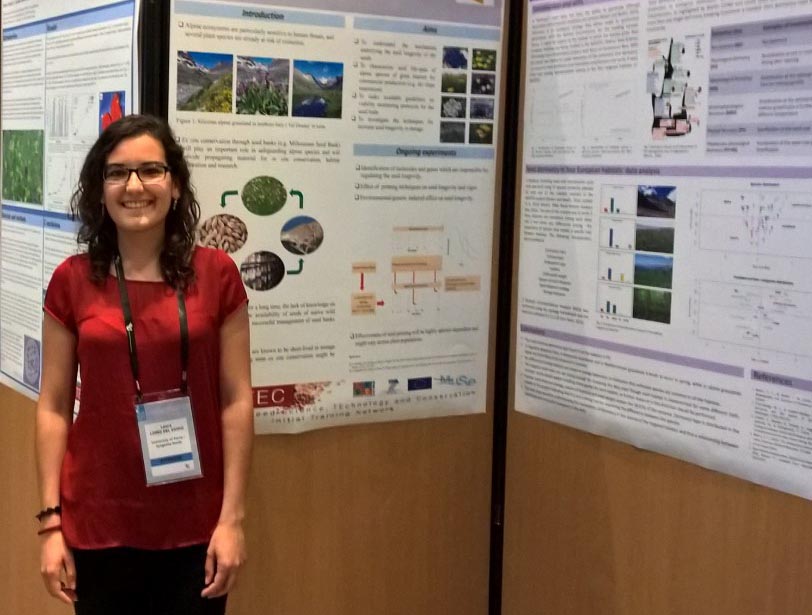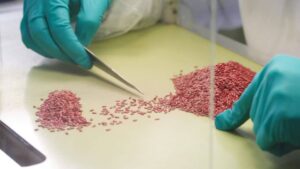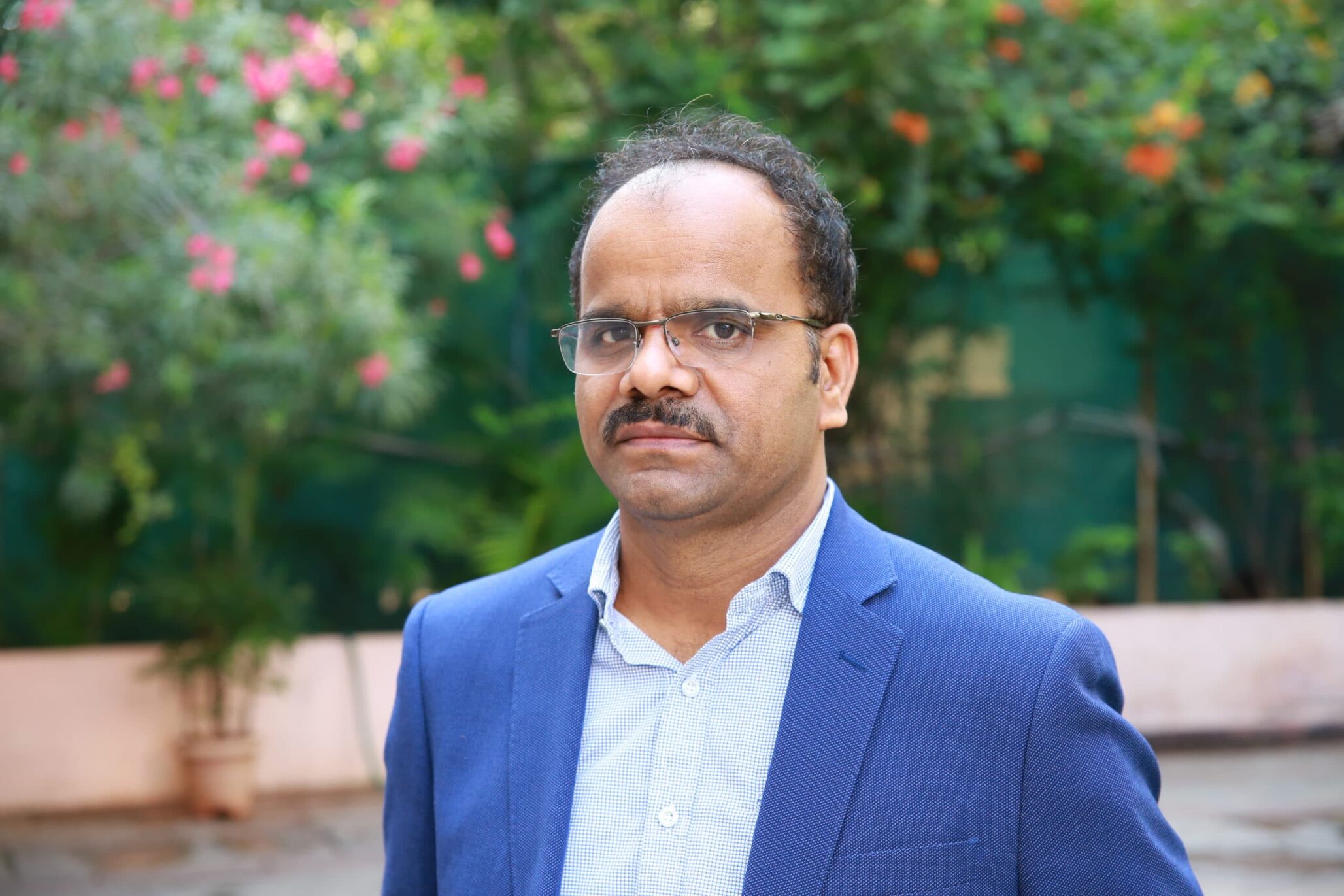Laura Lopez Del Egido completed her honors degree in biology, specializing in plant biology and ccology at the UAB in Barcelona. After graduating in 2013, she interned at the Plant Physiology Department (UAB) and focused on the resistance of rice (Oryza sativa) and some species of clover (Trifolium spp.) to the heavy metal pollutant antimony in hydroponic cultures. Egido started a second internship at the James Hutton Institute (JHI), with a focus on functional ecology of legumes and their symbionts, which led her to join the Ecological Sciences department as a research assistant. Here, she mainly worked on wild and arable legumes, nitrogen fixation and bacteria diversity. She balanced this work with a combined master’s program at the University of Edinburgh, the Royal Botanic Gardens of Edinburgh and the JHI.
Since then, Egido has gained interest in seed germination and decided to pursue an industrial doctorate degree from the Marie Curie initial training network NASSTEC (Native Seed Science, Technology and Conservation), in which she investigates the effect of seed treatments on the germination and establishment of a wide range of wild species.
The International Seed Testing Association (ISTA), through its Fresh in the Field spotlight, explores Egido’s perspective of attending the annual congress and her vision for seed testing in the future, among other topics.
ISTA: How and when did you first learn about ISTA?
LLDE: My background is not really in seed science, as it wasn’t until recently that I moved into the “seed” topic. So I think the “Fresh In The Field” really suits me! Because of that, I learned about ISTA a couple of years ago, when I started my Ph.D, within the NASSTEC project on seed treatments to improve germination of wild species.
ISTA: How is ISTA concretely helping you in your daily job?
LLDE: Since I started my Ph.D, I have been testing various seed species ,and ISTA provides a lot of useful information, which I have used and still use.
ISTA: How do you keep in touch with ISTA work? With ISTA community?
LLDE: I try to keep up to date by consulting the Internet, but also by talking to members of ISTA mainly through the NASSTEC network, as some of them are involved in the project, such as Dr Alison Powell.
ISTA: Why did you decide to attend the ISTA Congress in Tallinn last June?
LLDE: I decided to attend the Congress because of a few things. First of all because the sessions and the talks on the program looked very interesting, and I wanted to learn more! And, secondly because I wanted to meet some of the people that were attending.
ISTA: Did you have an experience with ISTA prior to attending this meeting?
LLDE: At Syngenta, we follow the seed testing protocols produced by ISTA, so it was when I started my Ph.D that I learned about it. I had not attended any ISTA event before the Congress in June.
ISTA: What are your main takeaways from this event?
LLDE: Where do I start …? I actually took a lot of positive things from it, I felt the conference was very nicely organixed, so it gave me some experience on how a conference is organized. Also, you have the possibility of learning from presentations by others, not only on topics that are of your main interest, but also topics you are not that familiar with. Besides, I liked the feedback you get from the other attendees. People are very friendly and it is easy to get around and discuss your work or that of others.
ISTA: Were you able to make some useful connections for your work during the Congress?
LLDE: During the Congress, I had the chance to meet people doing very interesting research. Also, you start to realize that there are actually a lot of people working on similar things. In addition, the Congress was a good occasion to gain information of where people are studying topics of your interest. Which is a good chance for collaboration and future opportunities.
ISTA: Would you recommend students and young researchers to attend similar events?
LLDE: Yes, definitely! It was a very useful experience for me. You can learn a lot in just a few days and it makes you look at some things from different perspectives, so it is very useful to get new ideas. Besides, attending these type of events helps you understand the specific needs of research in your topic and learn from what other people are doing. Also, you get the chance to meet people from many different places, which is very valuable.
ISTA: How about joining an ISTA Technical Committee one day?
LLDE: Maybe one day, I could not tell you now. I believe I still need to acquire a lot of experience in this topic, as seed testing is a relatively new thing to me. But I would love to attend other ISTA events to learn more about what is currently being done.
ISTA: If ISTA should change/improve one thing, what would it be?
LLDE: Well… Maybe the website could become a bit more interactive, and probably in this way the workshops could reach out to more people potentially interested in attending. However, I have heard that ISTA is working on improving that, so I look forward to seeing it!
ISTA: What is your vision for the future in seed testing?
LLDE: I feel that every day we know more and more about seeds and about new ways of testing them, by constantly improving protocols. However, I believe there are still a lot of methods that could be improved and optimised. Also, this mainly applies to cropped species, but there is still a lot of work to be done in regard to native species.
ISTA: How about your own future?
LLDE: My main focus at the moment is to finish my PhD. But what comes after is still to be decided! I thoroughly enjoy what I do, so I would like to continue working on this. But as I mentioned earlier, I have worked on other subjects, which I also enjoyed, so I am also open to other topics. We will have to see what options of funding are available!
ISTA: Laura, one last word?
LLDE: The ISTA Seed Symposium was very enjoyable and had the chance to meet motivating and experienced people in the field. I loved the city of Tallinn and the organization! Thank you for making it happen!













